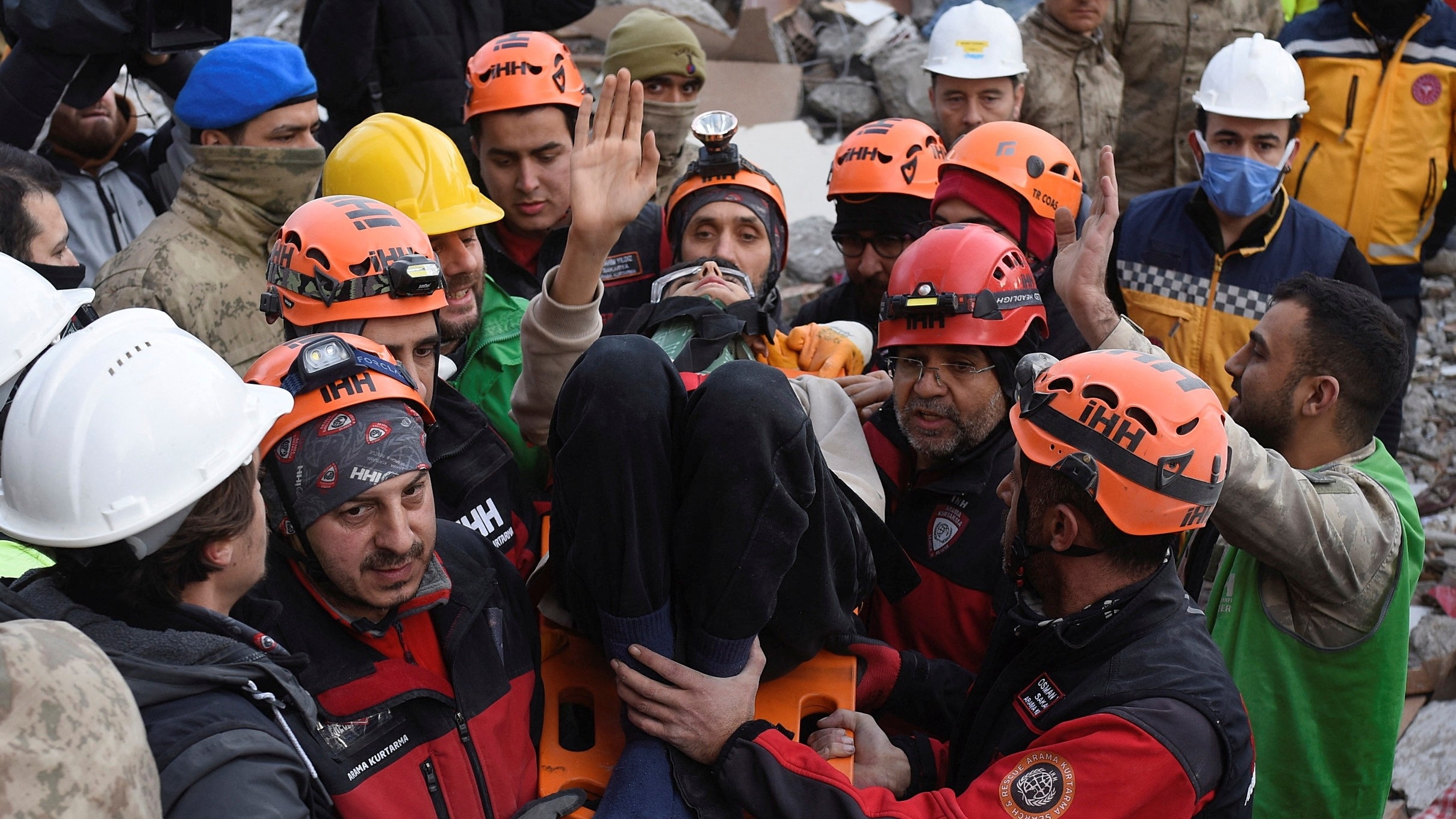Turkey-Syria earthquake: 'Miracle' survivors pulled out of rubble after five days

The aftermath of the devastating earthquake in southern Turkey and northern Syria has entered its fifth day, with survivors still being rescued from the wreckage.
Over 21,000 people have died since a 7.8-magnitude quake struck the southeastern Turkish city of Gaziantep on Monday, followed by a 7.5-magnitude quake in the Kahramanmaras province shortly after.
At least 17,674 died in Turkey, while 3,337 deaths have been registered in neighbouring Syria so far.
Experts say 90 percent of survivors under the rubble are found in the first 72 hours, a window that closed early Thursday morning.
But miraculous examples are still emerging of people being pulled from under the debris during the fourth and fifth days of rescue efforts.
Stay informed with MEE's newsletters
Sign up to get the latest alerts, insights and analysis, starting with Turkey Unpacked
A Turkish teenager, who was rescued after 94 hours in Gaziantep, said he had to drink his own urine to survive.
Adnan Muhammed Korkut, 17, seemed largely unscathed as he emerged from the rubble after four days, smiling to cheering crowds.
Korkut's mother could be heard shouting his name in joy and hugging him, before he was carried away on a stretcher.
Translation: Adnan Muhammed Korkut miracle in Gaziantep! He drank his urine for 5 days, prayed 5 times under the rubble
"Thank God you arrived," he said, hugging his mother.
The teenager's father, Mehmet Korkut, said that once he learned that his son was making a noise, he didn't leave the wreckage for days. Following his son's rescue, he prostrated in front of the rubble and prayed.
A mother and son were also rescued in the Diyarbakir province after spending over 100 hours under the debris.
Sebahat Varli, 32, and her 10-year-old son Serhat were pulled out alive from the wreckage in a collapsed building on Friday. They were taken to a nearby hospital.
Meanwhile, two sisters were saved from the rubble in Kahramanmaras on Friday.
Ayfer, 15, was rescued after being trapped for 99 hours, while her sister Fatma, 13, was retrieved by rescuers two hours later.
Also in Kahramanmaras, five-year-old Mina was pulled from under a collapsed building after 89 hours.
"I am very happy. I've never felt this happy before. I am very happy to rescue her," rescuer Murat Kaya told Anadolu Agency.
10-day-old infant rescued
In Hatay, one of the worst hit provinces, Yagiz Ulas, a 10-day-old newborn was found alive along with his mother after 90 hours.
Footage showed rescue workers carrying the baby, who had spent nearly half his life under the rubble, and wrapping him in a blanket.
Five-year-old Hazal and her mother Betul Guner were rescued in the central Antakya district late on Thursday night. A father and daughter were also saved from the same rubble.
Also in Antakya, a one-year-old baby and members of her family were pulled out alive.
Sela Elbarazi was saved in Antakya after being trapped for 96 hours, along with her mother, father, brother and uncle.
In northwest Syria, a child was retrieved from the wreckage at 11:17 local time on Friday morning in Jandaris, north of Aleppo, the civil defence group the White Helmets announced.
The organisation said that its team had retrieved 513 bodies and 830 wounded people from under the rubble in opposition-held areas of the country.
On Thursday, the White Helmets said that aid being delivered by the UN into northwestern Syria was routine assistance similar to aid given before the earthquake, and insufficient for rescue efforts.
"The UN are not delivering the aid that we are in most need of to help us save lives with time running out," said Raed al-Saleh, who leads the volunteer group.
This article is available in French on Middle East Eye French edition.
Middle East Eye delivers independent and unrivalled coverage and analysis of the Middle East, North Africa and beyond. To learn more about republishing this content and the associated fees, please fill out this form. More about MEE can be found here.




